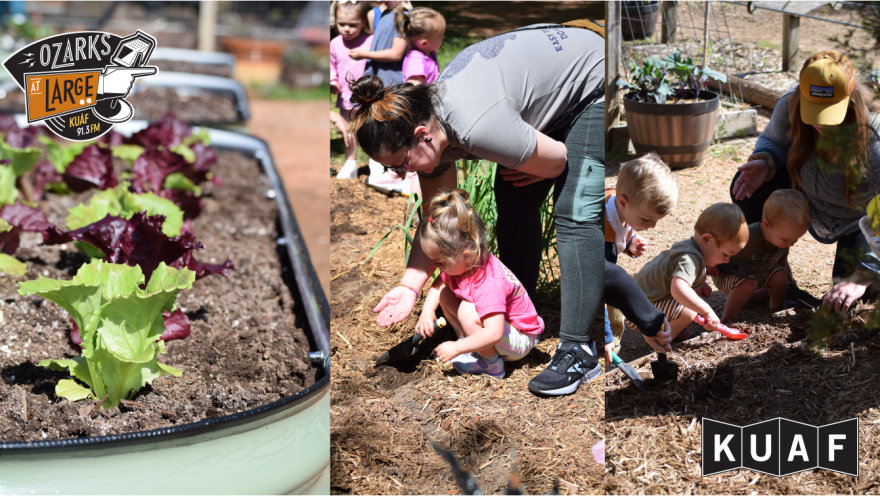The Botanical Garden of the Ozarks is one of just 26 gardens selected for the 2024 Urban Agriculture Resilience Program. John Berry is the director of philanthropy at the gardens, he said the funding will go towards programming geared towards children.
“Whether it’s playing games or telling stories,” Berry said, “everybody likes to get their hands dirty. The garden is the perfect place to do that.”
On Wednesdays during the summer, the Botanical Garden of the Ozarks hosts the Little Sprouts Garden program.
“They read a book, there’s some singing, they get out in the garden,” Berry said, “and then they get the dirt under their fingernails. We just love to see when they get to harvest something. When they pull the carrot out of the ground, it’s like, ‘This is my carrot,’ and it’s just very fulfilling for us to see that.”
Another element of the Little Sprouts Garden is what happens to the produce that’s grown.
“We want to make sure that the produce ends up in someone’s hands that can use it,” Berry said. “We know that we have so many neighbors in Northwest Arkansas who are food insecure, and we use the garden to teach and we want to make sure that the produce is used by people who can really us it.”
That’s where the folks at Seeds that Feed come in. Their organization collects produce grown locally and redistributes it to those in need. Margaret Thomas is the chief feeder there, she said they’ve been partnering with the Botanical Garden of the Ozarks for several years now, but last year was the first year they had real interaction with the kids involved in the Little Sprouts program.
“It was really cute,” Thomas said. “Getting to play with the kids and they were pulling carrots out of the garden and then they were walking over and giving them to me. The parents were saying, ‘There are going to go help feed people that are hungry,’ and I thought that was a great way for teaching 3-5 year old children that some people don’t have as much as we do.”
Berry said the money has allowed the gardens to enhance the Little Sprouts Garden area with raised beds, which will result in better yield for the crops. The beds already have lettuce and cold crops, and they plan to work with FoodLoops to provide education around compost.
“We try to have at least 90% diversion from the waste stream,” Berry said. Our food and compostable end up in the city of Fayetteville’s food recycling area. So, for these garden beds, we wanted to complete that circle, so we went to the city and got compost and amendments for the soil that was from food waste in Fayetteville. We see that circle coming around and we’re going to be able to tell that story.”
The funding will also allow them to improve their infrastructure to the beds.
“This allows us to be more sustainable by doing this,” Berry said. “We going to do drip irrigation versus fair irrigation, so each one of our beds will get the water it needs, and it will be set on a timer. We use cotton hull as barrier for weeds. What we found last year was that by doing raised beds, we increased the crops. The year before, we did about 700 pounds of food that we were able to donate to Seeds that Feed. Last year, we were able to contribute over 1,700 pounds. So we know that by doing the raised bed method, we’ll be able to contribute more, but we’ll also be able to tell that story to the community. Don’t think just because you live in an apartment that you can’t have fresh vegetables. You can do container gardening and you can have great crops in a small area.”
Not only will this provide better yield in crops, but hopefully better yield in education opportunities for the kids, too. Like teaching kids about the seasonal nature of plant growth.
“If you think about early childhood education and being able to tell that story early,” Berry said, “[the food] is going to taste different and that you have cold crops. We explained to the children that we’ve got broccoli and bok choy out now and that they won’t grow in the summer or they will be of a different quality. We tried an experiment last year with zucchini where they didn’t plant them until late because by then, any of the bugs that could destroy the roots had already wen though that cycle. So instead of putting a pesticide on it, we just planted at a different time to still have a great crop, but one that’s not damaged.”
One of the main groups that Seeds that Feed works with providing locally grown produce with is folks in elder care facilities.
“There’s something that we find really rewarding for us,” Thomas said, “because oftentimes they don’t have a lot of visitors and they want to eat healthy. This is the way that they ate when they were younger. So it’s a really cool thing for us, too. It’s the children and adults that get to enjoy the children’s garden.”
From the hands of children to the kitchen counters of folks old enough to be their grandparents, Seeds that Feed and the Botanical Garden of the Ozarks is working to keep that food loop growing.








